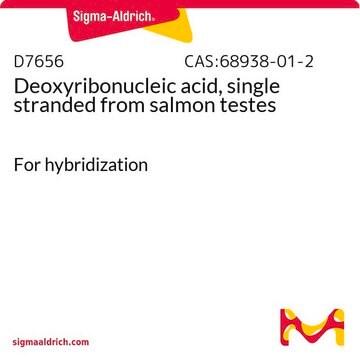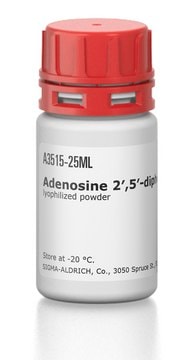Recommended Products
form
lyophilized powder
Quality Level
extent of labeling
≥20 μmol per mL
technique(s)
affinity chromatography: suitable
matrix
cross-linked 4% beaded agarose
matrix active group
epoxy
matrix attachment
through epoxy to hydroxyl
matrix spacer
12 atoms
swelling
1 g swells to ~3 mL
suitability
suitable for chromatography
storage temp.
−20°C
Looking for similar products? Visit Product Comparison Guide
General description
Epoxy-activated-Agarose is a resin. Ligands can be covalently linked to agarose via the interaction of the nucleophilic groups of the ligand with the epoxy group.
when ligands are coupled to free epoxy groups. Linkage is a stable, uncharged ether.
Application
Epoxy-activated-Agarose is a lyophilized powder, stabilized with lactose, which is used in affinity chromatography, protein chromatography and activated/functionalized matrices. Epoxy-activated agarose has been used in studies informing anti-proliferative activity on human-derived cancer cells as well as cancer prevention.
Other Notes
Ligand: 1,4-bis(2:3-Epoxypropoxy)butane
Attachment: one epoxy group
Spacer: provides a 12-atom spacer when ligands are coupled to free epoxy groups. Linkage is a stable, uncharged ether.
Attachment: one epoxy group
Spacer: provides a 12-atom spacer when ligands are coupled to free epoxy groups. Linkage is a stable, uncharged ether.
Physical form
Lyophilized powder stabilized with lactose
Storage Class Code
11 - Combustible Solids
WGK
WGK 3
Flash Point(F)
Not applicable
Flash Point(C)
Not applicable
Personal Protective Equipment
dust mask type N95 (US), Eyeshields, Gloves
Certificates of Analysis (COA)
Search for Certificates of Analysis (COA) by entering the products Lot/Batch Number. Lot and Batch Numbers can be found on a product’s label following the words ‘Lot’ or ‘Batch’.
Already Own This Product?
Find documentation for the products that you have recently purchased in the Document Library.
Donald Voet and Judith G. Voet
Biochemistry (2004)
Zhirong Wang et al.
Biochemical and biophysical research communications, 323(3), 743-749 (2004-09-24)
The phytochemical resveratrol (trans-3,4',5-trihydroxystilbene) is a naturally occurring polyphenol with a plethora of health-beneficial properties, including a preventive role in cancer. We surmise that resveratrol may exert its diverse biological effects by interacting with specific target proteins, denoted RTPs. To
G J Fennington et al.
Microbiology (Reading, England), 142 ( Pt 2), 321-330 (1996-02-01)
The Rhizobium leguminosarum bv. trifolii BAL fructokinase (frk) gene was isolated on a 2 center dot 4 kb BamHI fragment from the cosmid pLA72 by complementation analysis of the Tn5-induced frk mutant BAL79, and confirmed by hybridization analysis. The nucleotide
S Ranganathan et al.
Biochimica et biophysica acta, 1182(3), 311-316 (1993-10-20)
Glyoxalase-I (Gly-I) is part of the glyoxalase system which converts methylglyoxal to D-lactic acid via an S-D-lactoylglutathione intermediate. This glutathione (GSH)-binding protein was purified from human colon tumors and corresponding normal tissue. The GSH-affinity purified fraction from normal human colon
Adel M Nour et al.
Infection and immunity, 77(3), 1262-1271 (2009-01-07)
Multiple microbial components trigger the formation of an inflammasome complex that contains pathogen-specific nucleotide oligomerization and binding domain (NOD)-like receptors (NLRs), caspase-1, and in some cases the scaffolding protein ASC. The NLR protein Nalp1b has been linked to anthrax lethal
Our team of scientists has experience in all areas of research including Life Science, Material Science, Chemical Synthesis, Chromatography, Analytical and many others.
Contact Technical Service





